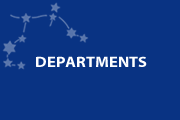- HOME
- DEPARTMENTS
- Faculty of Science
Faculty of Science

Small classes enable students to acquire specialized knowledge for real world application.
Science (which includes mathematics and physics) is dedicated to the exploration of truth, and in recent years a great deal of progress has been made in scientific research.
The advancement of science has thus made a tremendous contribution to progress in the world. Smartphones and GPS are just two examples of technological developments that are ultimately based on advanced theoretical physics, such as quantum mechanics and the theory of relativity. Security on the Internet is based on mathematics such as coding theory and number theory—which concerns prime numbers.
The Faculty of Science enables students to experience the interest and beauty of learning. We attach the utmost importance to giving our students a profound mastery of the basics of science so as to nurture human resources ambitious enough to utilize science for the development of society. Our curriculum is designed to impart a full understanding of the basic principles of natural science, upon which students are able to solve a wide range of problems. A freshman training program in particular allows new students to easily gain familiarity with college math and physics where the focuses are shifted from those of high school math and physics. In the third and fourth years, students participate in small classes for special research or conduct special experiments to gain deeper understanding in specialized areas and to develop reasoning and problem-solving abilities, along with presentation skills.
The “Global HR Program,” a collaboration between the Faculty of Foreign Languages and the three science faculties, is being launched in 2014, and global science courses are commencing at each science faculty. These courses will motivate and train our students to spread their specialized knowledge around the world competently in English.
Department of Mathematics
At the Department of Mathematics we teach algebra, geometry, analysis, and applied mathematics, enabling our students to choose between any of the following routes: education, industry, the civil service, and post-graduate studies. We are supporting students who wish to become teachers through a number of programs, such as our “Mathematics Education Course” in which junior high and high school mathematics is taught from the perspective of university mathematics, and through teachers’ exam seminars, as well as other educational initiatives.
Department of Physics
The Department of Physics provides research opportunities in theoretical and experimental physics. Courses are offered in; physics - such as classical mechanics, thermodynamics, electromagnetism, statistical mechanics and quantum mechanics. We also offer courses in; practical physics including physical experiments and computer literacy as well as mathematics necessary for physics. During the fourth year, each student is attached to a laboratory and engages in theoretical or experimental research. For graduate students, master's and doctoral programs are offered.
Department of Astrophysics and Atmospheric Sciences
The Department of Astrophysics and Atmospheric Sciences provides opportunities to comprehensively study large scale physics such as astronomy, astrophysics, planetary science and meteorology.
In addition to a wide variety of lecture courses on astrophysics and atmospheric sciences, students are able to enroll in practical courses for greater research training, e.g., data taking (or observation), and data analysis.
Part of the educational program collaborates with our university observatory, which has one of the largest telescopes at a private university in Japan as well as amongst domestic/foreign research institutes for astrophysics and atmospheric sciences.






